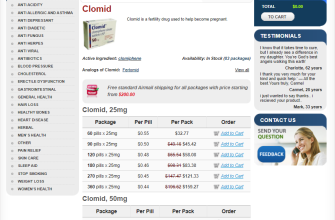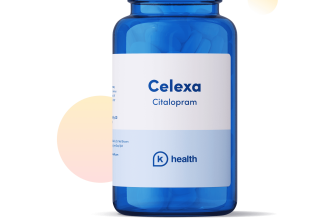Need medication quickly and conveniently? Consider using a reputable online pharmacy. We’ve compiled a list of factors to help you choose wisely, focusing on factors like licensing, customer reviews, and security protocols.
Verify a pharmacy’s license with your state’s board of pharmacy. This single step significantly reduces the risk of encountering fraudulent operations. Look for easily accessible contact information–a legitimate pharmacy will provide a phone number, email address, and physical address.
Don’t just rely on star ratings; dig deeper into customer reviews. Pay close attention to comments regarding order fulfillment speed, customer service responsiveness, and the overall security of the website. Check multiple review platforms to get a broader perspective. Secure payment gateways using SSL encryption are a must. Look for the padlock icon in your browser’s address bar.
Remember that price shouldn’t be the sole deciding factor. A suspiciously low price often signals a lack of quality or authenticity. Prioritize your health and safety by choosing licensed pharmacies with proven track records. Your well-being is invaluable.
- Farmacias Online USA: A Comprehensive Guide
- Prescription Drug Safety
- Pricing and Shipping
- Customer Service
- Final Recommendation
- Legality and Regulations of Online Pharmacies in the USA
- Finding Reputable and Licensed Online Pharmacies
- Comparing Prices and Services Across Different Online Pharmacies
- Factors Beyond Price
- Sample Price Comparison Table
- Additional Tips
- Understanding Prescription Requirements and the Ordering Process
- Ensuring the Security and Privacy of Your Personal and Medical Information
- Protecting Your Data During Transactions
- Understanding Your Rights and Pharmacy Responsibilities
- Choosing Reputable Online Pharmacies
- Common Medications Available Through Online Pharmacies
- Potential Risks and Benefits of Using Online Pharmacies
- Benefits: Convenience and Cost Savings
- Risks: Counterfeit Medications and Privacy Concerns
- Managing Shipping, Delivery, and Returns
Farmacias Online USA: A Comprehensive Guide
Verify the pharmacy’s legitimacy using the NABP (National Association of Boards of Pharmacy) website. This ensures they’re licensed and operate legally.
Check for verified customer reviews on independent platforms like Trustpilot or Yelp. Focus on reviews mentioning prescription fulfillment, customer service, and shipping times. Avoid sites directly associated with the pharmacy.
Prescription Drug Safety
Always confirm the pharmacy’s security protocols. Look for mentions of SSL encryption and data privacy policies. Understand their handling of sensitive medical information is paramount.
Understand their return policy. Knowing how to handle incorrect or damaged medications is critical. A clear and accessible return policy offers buyer protection.
Pricing and Shipping
Compare prices across multiple online pharmacies. Don’t just focus on the initial cost; account for shipping fees and any potential taxes.
Inquire about shipping times and methods. Confirm whether they offer expedited shipping options if needed, and understand potential delays.
Customer Service
Evaluate the availability of customer support. Check for multiple contact methods–phone, email, and live chat–for easy communication if issues arise.
Read reviews specifically addressing customer service experiences. Look for comments on responsiveness, helpfulness, and resolution times.
Final Recommendation
Prioritize pharmacies with transparent policies, positive reviews, secure practices, and readily accessible customer service. Remember thorough research protects your health and well-being.
Legality and Regulations of Online Pharmacies in the USA
The legality of online pharmacies in the USA hinges on licensing and compliance with federal and state laws. Only pharmacies licensed by their respective state boards of pharmacy can legally dispense prescription drugs online to residents within that state. This includes verifying prescriptions, ensuring proper handling and storage, and adhering to patient privacy regulations such as HIPAA.
The FDA regulates the manufacturing and distribution of medications, including those sold online. Online pharmacies must meet strict standards for drug safety and efficacy. Failure to comply can result in significant fines and legal action.
Consumers should confirm a pharmacy’s license via their state board of pharmacy’s website before using their services. Check the pharmacy’s physical address and verify it’s not a virtual mailbox or P.O. box. Legitimate pharmacies will readily provide this information.
Beware of suspiciously low prices and pharmacies that don’t require a valid prescription. These are common red flags indicating illegal operations potentially selling counterfeit or dangerous medications. Your health and safety are paramount.
The DEA plays a significant role in overseeing the distribution of controlled substances. Online pharmacies dispensing controlled substances must adhere to rigorous DEA regulations, including maintaining detailed records and participating in drug monitoring programs.
If you have concerns about a specific online pharmacy, report them to the FDA and your state board of pharmacy. They investigate complaints and take appropriate action against non-compliant businesses.
Finding Reputable and Licensed Online Pharmacies
Verify licenses and accreditations. Check the pharmacy’s website for a license number and accreditation details. Confirm this information with your state’s board of pharmacy or a reputable accreditation body like the Verified Internet Pharmacy Practice Sites (VIPPS).
Look for secure online transactions. Ensure the website uses HTTPS (look for the padlock icon in your browser’s address bar) and offers secure payment gateways like PayPal or Stripe.
- Check for a physical address and contact information. Legitimate pharmacies will have a clearly stated physical address and multiple ways to contact customer service (phone, email, live chat).
- Read customer reviews and testimonials. Websites like Trustpilot or Google Reviews can provide valuable insight into a pharmacy’s reputation for reliability and customer service.
Scrutinize their privacy policy. A legitimate online pharmacy will have a detailed privacy policy outlining how they protect your personal and health information. Be wary of pharmacies lacking transparency in this area.
- Be cautious of unbelievably low prices. Extremely discounted medication is often a red flag, signaling potentially counterfeit or substandard drugs.
- Beware of pharmacies that don’t require a prescription. A legitimate online pharmacy will always require a valid prescription from a licensed physician.
- Avoid pharmacies that aggressively solicit customers or employ high-pressure sales tactics.
Consult your doctor or pharmacist. Discuss your medication needs and online pharmacy options with your healthcare provider to ensure you’re making a safe and informed choice.
Comparing Prices and Services Across Different Online Pharmacies
Start your search with a price comparison website specializing in prescription drugs. These sites aggregate prices from multiple online pharmacies, saving you the trouble of checking each individually. Look for sites that allow filtering by medication and insurance coverage.
Factors Beyond Price
Price isn’t everything. Consider these critical factors when comparing pharmacies:
Shipping speed and cost: Some offer free or expedited shipping. Compare delivery times and costs to find the best value for your needs. Free shipping isn’t always the cheapest option if the delivery time is significantly longer.
Customer service: Read reviews and check for readily available customer support options (phone, email, chat). A responsive customer service team is invaluable if you encounter issues with your order.
Licensing and accreditation: Verify the pharmacy’s legitimacy through state licensing boards and reputable accreditation organizations. Look for verification seals on their website.
Medication selection: Not all online pharmacies carry the same medications. Check if your required prescription is available before committing to a pharmacy.
Security protocols: Ensure the pharmacy uses secure encryption (HTTPS) to protect your personal and financial information. Check their privacy policy for details.
Sample Price Comparison Table
| Pharmacy | Medication A (30-day supply) | Shipping Cost | Delivery Time | Customer Reviews |
|---|---|---|---|---|
| Pharmacy X | $50 | $10 | 3-5 days | 4.5 stars |
| Pharmacy Y | $45 | Free | 7-10 days | 4 stars |
| Pharmacy Z | $55 | $5 | 2-3 days | 4.2 stars |
Additional Tips
Always check your insurance plan’s formulary before ordering to ensure coverage. Be aware of potential scams; legitimate pharmacies will never ask for payment through untraceable methods.
Understanding Prescription Requirements and the Ordering Process
First, verify your prescription is valid and hasn’t expired. Most online pharmacies require a current prescription from a licensed US doctor.
Next, locate your prescription information. You’ll need the medication name, dosage, and quantity. Having this readily available speeds up the process.
- Some pharmacies accept photos of your prescription; check their specific requirements.
- Others may require an electronic prescription sent directly from your doctor.
Choose a reputable online pharmacy. Check for licensing and accreditation information on their website. Look for customer reviews to gauge their reliability and service.
- Create an account. You’ll likely need to provide personal information, including your address and insurance details (if applicable).
- Upload your prescription. Follow the pharmacy’s instructions carefully. Incorrect uploads can cause delays.
- Review your order. Double-check the medication details and quantity before proceeding to checkout.
- Select a payment method. Most pharmacies accept major credit cards and sometimes offer payment plans.
- Confirm your order. You’ll receive an order confirmation email with tracking information once your order ships.
Expect shipping times to vary depending on the pharmacy and your location. Contact customer service if you have questions about the status of your order. Remember to dispose of medications properly according to your local regulations.
If you encounter problems, contact the pharmacy’s customer service immediately. They can assist with order issues or questions about prescription requirements.
Ensuring the Security and Privacy of Your Personal and Medical Information
Check the pharmacy’s website for security certifications like HIPAA compliance or similar data protection standards. Look for an easily accessible privacy policy detailing how they handle your data.
Protecting Your Data During Transactions
Use strong, unique passwords and enable two-factor authentication if offered. Avoid using public Wi-Fi when accessing your online pharmacy account. Pay attention to the URL; ensure it’s secure (starts with “https”). Review your credit card statements regularly for unauthorized charges.
Understanding Your Rights and Pharmacy Responsibilities
Familiarize yourself with the pharmacy’s privacy policy, especially regarding data retention and access. Know your rights regarding access to, correction of, and deletion of your personal information. Report any suspicious activity immediately to the pharmacy and your credit card company.
Choosing Reputable Online Pharmacies
Verify the pharmacy’s license and accreditation with relevant regulatory bodies. Read independent reviews from other customers. Be wary of unusually low prices or pharmacies that pressure you to buy. Consider using pharmacies with established reputations and a history of secure practices.
Common Medications Available Through Online Pharmacies
Many online pharmacies offer a wide selection of prescription and over-the-counter medications. You can usually find common medications for allergies, such as Cetirizine (Zyrtec) or Loratadine (Claritin). Pain relief options frequently include Ibuprofen (Advil, Motrin) and Acetaminophen (Tylenol).
For heartburn relief, many online pharmacies stock Omeprazole (Prilosec) and Ranitidine (Zantac). Common cold and flu medications like Dextromethorphan (Robitussin DM) and Guaifenesin (Mucinex) are also widely available. If you need allergy or sinus relief, you’ll likely find pseudoephedrine or phenylephrine-based decongestants.
Important Note: Always verify the legitimacy of any online pharmacy before making a purchase. Check for licensing and accreditation. Consult your doctor before starting any new medication, even over-the-counter options, to ensure it’s appropriate for your health conditions and doesn’t interact with other medications you are taking.
Disclaimer: This information is for general knowledge and does not constitute medical advice. Always consult a healthcare professional for any health concerns or before starting a new medication regimen.
You might also find medications for conditions like high blood pressure, high cholesterol, and diabetes available through online pharmacies, but obtaining these typically requires a valid prescription from your doctor. Always confirm the pharmacy’s prescription process before ordering.
Many online pharmacies offer convenient medication refills and reminders, streamlining your medication management. Compare prices and services between pharmacies before making a decision. Read customer reviews to assess their experiences.
Potential Risks and Benefits of Using Online Pharmacies
Always verify the online pharmacy’s legitimacy with your state’s board of pharmacy and the National Association of Boards of Pharmacy (NABP) before ordering. This simple check helps avoid counterfeit drugs or unlicensed sellers.
Benefits: Convenience and Cost Savings
Online pharmacies offer unparalleled convenience, allowing you to refill prescriptions from home. Many offer competitive pricing, sometimes significantly lower than brick-and-mortar stores. However, factor in shipping costs and potential price discrepancies between different online pharmacies.
Risks: Counterfeit Medications and Privacy Concerns
The biggest risk is receiving counterfeit medications. These can be ineffective, contain harmful ingredients, or have incorrect dosages. Secure your personal information by only using verified, NABP-accredited online pharmacies with robust security protocols and transparent privacy policies. Be wary of pharmacies that request excessive personal details or operate without clear contact information.
Another concern involves data breaches. Choose online pharmacies with strong security measures like SSL encryption to protect your health information. Regularly review your credit card and health insurance statements for unauthorized charges.
Finally, understand your rights as a patient. Carefully review the terms and conditions, return policies, and customer support options before making a purchase. Document all communications with the pharmacy for future reference.
Managing Shipping, Delivery, and Returns
Check the pharmacy’s shipping policy carefully before ordering. Many offer expedited shipping for a fee, usually arriving within 2-3 business days. Standard shipping typically takes 5-7 business days.
Confirm your shipping address is accurate. Incorrect addresses lead to delays or lost packages. Use a reliable shipping address, like your home or workplace, and provide a phone number for delivery notifications.
Track your package using the provided tracking number. Most online pharmacies email this number once your order ships. This helps you monitor delivery progress and anticipate arrival.
For returns, contact customer support immediately. They’ll guide you through the return process. Usually, you’ll need to obtain a return authorization number and ship the item back using a prepaid shipping label (if provided). Return shipping costs vary; some pharmacies cover them, while others may deduct them from your refund.
Read the return policy thoroughly. Understand the timeframe for returns and any limitations on eligible items for return or exchange. Understand the refund process; it might take several business days to process. Keep your order confirmation and tracking information for reference.










